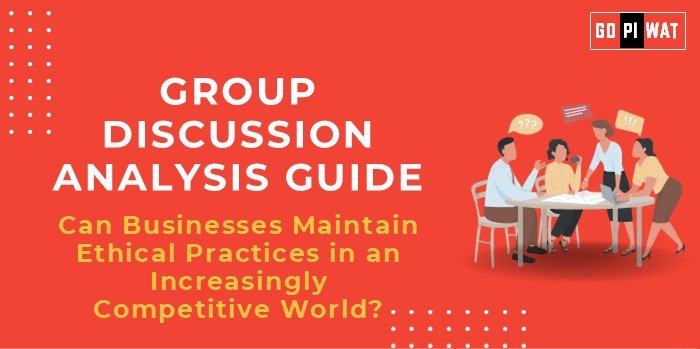📋 Group Discussion (GD) Analysis Guide
🌐 Topic: Can Businesses Maintain Ethical Practices in an Increasingly Competitive World?
🌟 Introduction to the Topic
- 📌 Opening Context: “In today’s global marketplace, businesses face unparalleled pressure to outperform competitors, raising critical questions about the feasibility of maintaining ethical standards.”
- 📌 Background: Business ethics has long been a cornerstone of corporate governance, but globalization, technological advancements, and shareholder demands have heightened challenges, compelling firms to reassess their practices.
📊 Quick Facts and Key Statistics
- 💸 Global Fraud Losses: In 2023, consumers reported losing over $10 billion to fraud, marking a 14% increase from 2022.
- 🌍 Consumer Willingness to Pay for Sustainability: Consumers are willing to spend an average of 9.7% more on sustainably produced goods, even amid inflationary concerns.
- 📡 Telecommunications Fraud: Increased by 12% in 2023, resulting in an estimated $38.95 billion in losses, representing 2.5% of telecommunications revenues.
🤝 Stakeholders and Their Roles
- 🏢 Businesses: Implement ethical guidelines and corporate social responsibility (CSR) initiatives.
- 🛍️ Consumers: Drive demand for ethical products and hold companies accountable.
- ⚖️ Regulatory Bodies: Enforce laws and regulations to ensure fair practices.
- 🌐 NGOs: Monitor corporate behavior and advocate for ethical standards.
🏆 Achievements and ⚠️ Challenges
Achievements
- ✅ Increased Transparency: More companies are adopting transparent reporting practices, enhancing stakeholder trust.
- 🌱 Sustainable Practices: Businesses are integrating sustainability into their operations, responding to consumer demand.
Challenges
- 💰 Profit Pressures: The drive for higher profits can lead to compromised ethical standards.
- 🌍 Global Supply Chains: Ensuring ethical practices across diverse and complex supply chains remains difficult.
🌍 Global Comparisons
- 🇳🇴 Success: Nordic countries are recognized for high ethical business standards and transparency.
- 🌍 Challenges: Emerging markets often struggle with enforcing ethical practices due to regulatory and economic constraints.
📖 Case Study
Patagonia: Exemplifies a commitment to environmental sustainability and ethical labor practices, balancing profitability with ethical responsibility.
📄 Structured Arguments for Discussion
- Supporting Stance: “Ethical practices enhance brand reputation and customer loyalty, leading to long-term profitability.”
- Opposing Stance: “In highly competitive markets, strict adherence to ethics can result in higher costs and reduced competitiveness.”
- Balanced Perspective: “While ethical practices may present short-term challenges, they are essential for sustainable success and risk mitigation.”
🗣️ Effective Discussion Approaches
- 📊 Opening Techniques:
- “With global fraud losses exceeding $10 billion in 2023, the importance of ethical business practices is more evident than ever.”
- “Patagonia’s commitment to sustainability demonstrates that ethical practices can coexist with profitability.”
- 📌 Counter-Argument Handling:
- Acknowledge the challenges of maintaining ethics in competitive markets.
- Highlight long-term benefits such as brand loyalty and risk reduction.
- Provide examples of companies successfully integrating ethics and profitability.
📈 Strategic Analysis of Strengths and Weaknesses
Strengths
- Builds consumer trust and loyalty.
- Attracts and retains talent.
- Mitigates legal and financial risks.
Weaknesses
- Potential for increased operational costs.
- Possible short-term profit reduction.
Opportunities
- Access to new markets valuing ethical standards.
- Innovation in sustainable products and services.
Threats
- Competitors exploiting lower ethical standards.
- Consumer skepticism due to greenwashing.
🎓 Connecting with B-School Applications
- 🌍 Real-World Applications:
- Understanding the balance between ethics and competition is vital for roles in corporate strategy, marketing, and operations.
- 📚 Sample Interview Questions:
- “How can a company maintain ethical standards while pursuing aggressive growth?”
- “Discuss a situation where ethical considerations might conflict with business objectives.”
- 💡 Insights for Students:
- Develop frameworks for ethical decision-making.
- Study cases where businesses have successfully integrated ethics into their competitive strategies.
📄 Conclusion
Businesses can maintain ethical practices even in competitive markets by fostering transparency, integrating sustainability, and prioritizing long-term over short-term gains. While challenges exist, successful examples like Patagonia show that ethical behavior aligns with profitability, fostering trust and ensuring sustainable growth.


